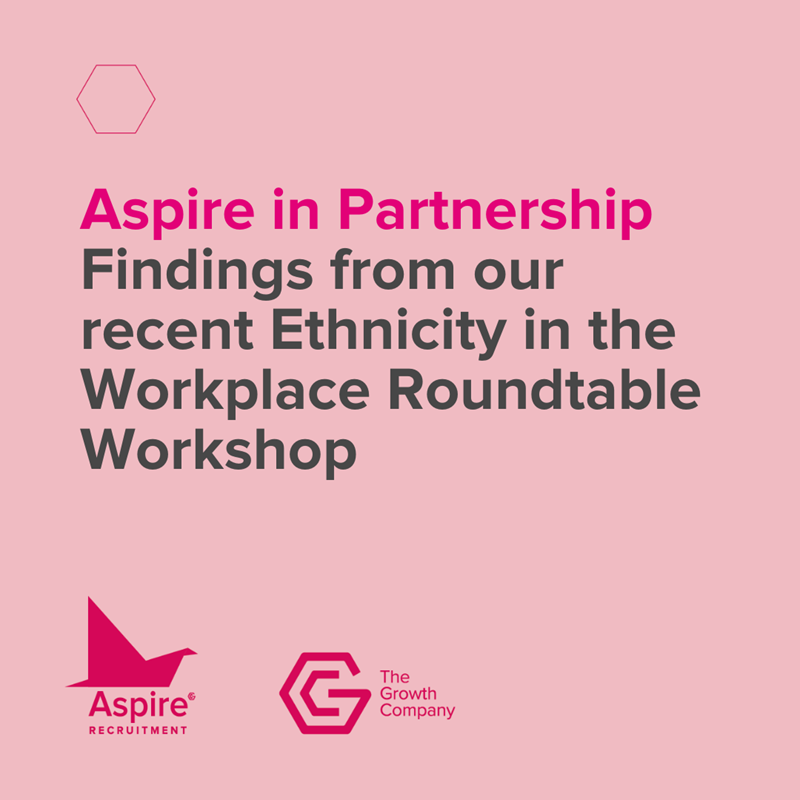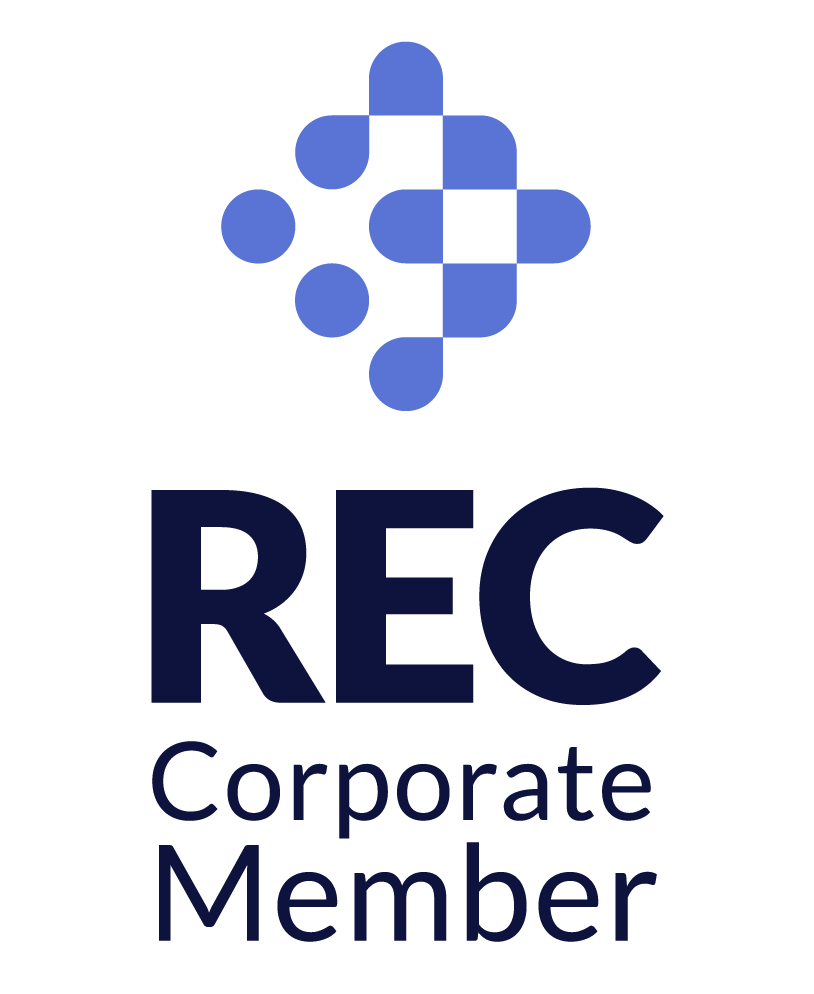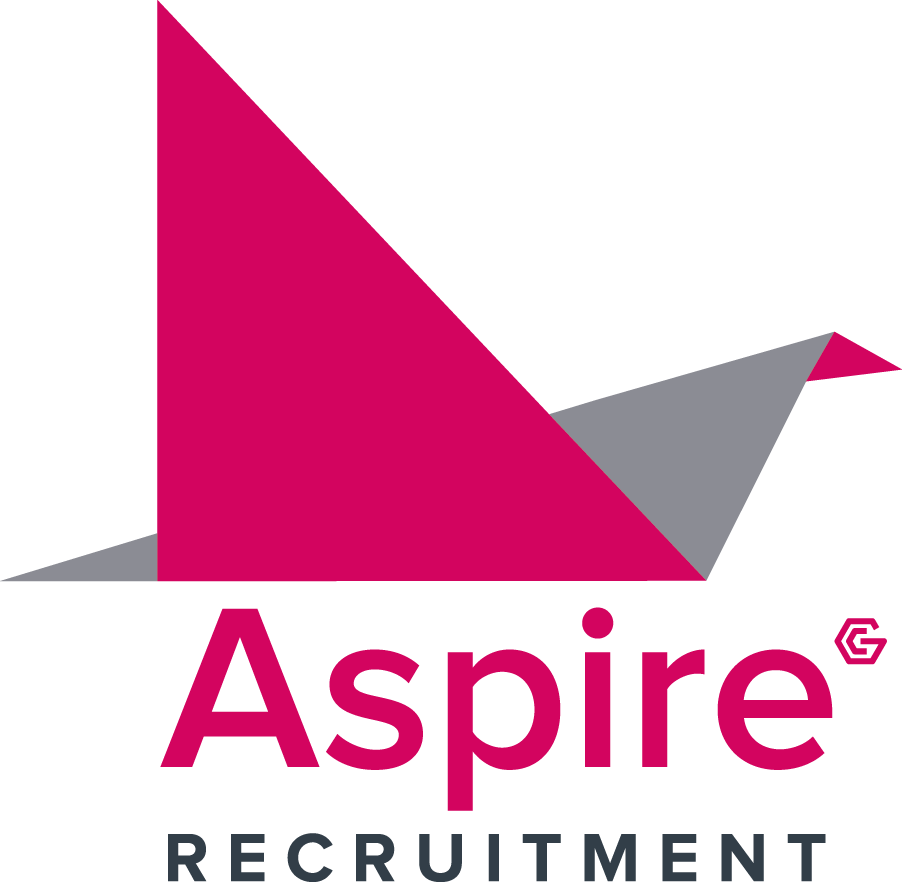Aspire in Partnership: Findings from our recent Ethnicity in the Workplace Roundtable Workshop

As part of the Growth Company’s continuous improvement programme and in order to ensure services meet the needs of employers, we have recently been running a series of employer focus group sessions (the next one is on 12th June, please contact fern.goddard@gcemployment.uk for an invite).
During previous sessions, it became apparent that many employers struggle with aspects of Diversity & Inclusion. With this in mind, a series of workshops have been developed to tackle specific issues of the EDI agenda. Previously we have delivered workshops on Disability & Age. The latest workshop was held online on 18th May, the topic was Ethnicity in the Workplace.
As with previous sessions, employers were asked to submit the challenges they were facing when trying to attract candidates from a diverse range of backgrounds, in this case, ethnic communities. Out of the responses we received, two challenges were chosen for discussion-
- Employer A established several years ago in the tech space and now employs 80 people. Following a recent internal audit, they realised that their employees are predominantly White British. They then looked at the ethnicity of the job applicants who’d applied historically to find that the majority of applicants were also White British.
- They would like to know how to attract more ethnically diverse candidates.
- Employer B is a large organisation, which provides a wide range of services to all areas of their local community and have roles available at all levels of their structure. Over the last few years they have seen a rise in the number of applications from people whose first language isn’t English. They are finding that the majority aren’t hired, even though some of the roles only require a basic understanding of English. It’s now having an impact on their ability to fill the vacancies they have.
- How can they change their processes so more candidates are successful?
Delegates were asked to discuss each challenge in groups, focussing on what they had done in their own organisations to tackle similar problems. Each group then fed back on the issues and solutions they’d discussed.
Here’s a summary of the solutions suggested-
- Consider the language used to describe the role
- List desirable languages
- Be transparent about the need to diversify ethnicities with colleagues
- Community outreach work - find where your desired ethnic community lives and build relationships with community organisations. Employers who do this see a spike in applications from candidates in the days following.
- Have a range of people on posters and other media, websites etc.
- Myth bust in local communities.
- Get involved in cultural events. A recent one included breaking the fast with Muslims (Iftar).
- Think about where to post adverts.
- School engagement.
- Work with external organisations such as 10000 Black Interns, BURN or places of worship.
- Think about onboarding so people feel included from Day One. New hires are more likely to remain if they see colleagues like themselves thriving.
- Where possible have diverse interview panels
- Have a clear idea why you’re keen to hire from specific communities. Know your data and show how you currently reflect the communities you serve.
- Ensure the leaders of the organisation are clear and vocal on the importance of Diversity & Inclusion.
- Have robust polices on bullying & harassment in the workplace.
- Help colleagues understand biases so they can be mindful when making decisions.
- Ensure the message across the organisation is cohesive. This will often require HR, Recruitment & Marketing functions to work in tandem.
- Consider introducing a blind application process. Depending on where you’re up to on your D&I journey will vary the impact.
- Foster a culture of inclusivity. D&I should never be an add-on.
All of the above are applicable to both of the challenges presented. In relation to candidates where English isn’t their first language, there are several extra areas of best practice you can implement including-
- Speak slowly and clearly: Speaking slowly and clearly can help the candidate better understand what you are saying.
- Use simple language: Avoid using complicated vocabulary or technical jargon that the candidate may not be familiar with.
- Give the candidate time to process: Allow the candidate to take their time to process and respond to questions.
- Avoid idioms and colloquialisms: Idioms and colloquialisms can be difficult for non-native speakers to understand, so it's best to avoid them during the interview.
- Provide written materials: Providing written materials such as interview questions, job descriptions, and company information in advance can give the candidate a chance to review the material and better understand the conversation.
- Avoid interrupting: Avoid interrupting the candidate or finishing their sentences, as this can be seen as disrespectful or patronizing.
- Be patient and understanding: Remember that the candidate may be nervous or unfamiliar with the interview process, so it's important to be patient and understanding.
On the subject of language, attendees had noted prior to the event that there’s confusion around the language that is and isn’t acceptable when dealing with ethnicity. To help clear up some of the confusion, Mysha Williams who is the EDI Manager for GC Employment and also co-chair of EmbRace which is GC’s Employee Representative Group (ERG) for Ethnicity spoke about language and how EmbRace considered what language to use when referring to race in 2022. At the time, members felt the acronym BAME wasn’t appropriate as it didn’t cover all ethnicities.
The group decided to put the following terms to their members so they could vote on which they felt was appropriate for them: Ethnic Minority, Global Majority, Racially Minoritised and Ethnic Communities. Ethnic Communities won 84% of the vote. Whilst we can’t know for sure why, it is the only term that doesn’t ‘other’ in any way and is fully inclusive. Several attendees commented that they liked the phrase for that reason.
Speaking of communities, we also spoke about Employee Representative Groups as most of the attendees worked for organisations that have established ERGs. It was asked whether we knew of any networks that existed specifically for chairs of ERGs so they could discuss common issues and share best practice. As far as we’re aware, there currently isn’t one in the North West of England.
So, we’re going to set one up.
If you are reading this as a member of an ERG in your organisation and would like to be involved (or if you know someone who would), please email Adrian.bird@gcemployment.uk. We’re aiming to hold the first meeting in early June.
Our next Roundtable Workshop is on 27th June at 9.30 on the subject of Gender Equity in the Workplace and the challenges faced by employers in attracting females into industries that are perceived as male-dominated. To register for that event, please click on this link.
We look forward to seeing you there!
Manchester Office
Lee House
90 Great Bridgewater Street
Manchester
M1 5JW



